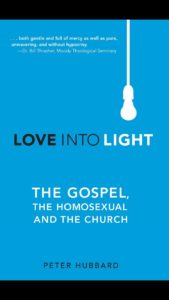Homosexual Addictive Behavior
“Slowly but surely, the American public is embracing homosexuality as normal behavior. Stop! Before your mind has totally accepted this train of thought, would you allow that train to make a pit stop at a station called “addiction”?
First, listen to the words of Noah Webster. He defines an addict as “any person who by habit or strong inclination indulges in something.” Second, Edward T. Welch and Gary Shogren in their book Addictive Behaviors state, “Addiction is bondage to the rule of a substance, activity, or state of mind, which then becomes the center of life, defending itself from the truth so that even bad consequences don’t bring repentance, and leading to estrangement from God.” Third, Jeffrey Satinover, M.D. in Homosexuality and the Politics of Truth makes this statement, “Because the reinforcement mechanism (cessation of pain, pleasure) for the biological drives is medicated by naturally occurring opiates in the brain, to rename as addictions those compulsions that fall within any of the biological drives; hunger, aggression, sex–is not far off the mark. It is especially accurate in the domain of sex.” Finally, hear the heart cry of former homosexual Andrew Comiskey in his book Pursuing Sexual Wholeness. “After my first homosexual experience at age sixteen, I quickly developed an addiction to it because of the affirmation and sense of acceptance I was finally receiving from other men.” By applying Webster’s definition of addict stated above, one can clearly see that Andrew had the strong inclination to repeat the homosexual experience, believing that this would fulfill his need for male affirmation and acceptance.
Welch and Shogren, as mentioned earlier, say that addiction is bondage to the rule of an activity or state of mind. For Andrew Comiskey, the state of mind was acceptance and the activity was sex with men. Hopefully by now, the relationship between homosexuality and addictive behavior is coming into focus. It is the belief of this author that, more often than not, homosexuality is an ungodly answer to a God-given emotional need, which leads to a lifestyle of addictive behavior. Welch and Shogren also state that addiction becomes the central focus of a person’s life and that the person would defend the addiction even in light of the truth.
Dr. Larry Crabb in Understanding People reminds us that, “all behavior is moving in a direction toward a chosen goal.” A person would have to have their “head in the sand” so to speak and be secluded from the news media in America to avoid the outcry of militant homosexual groups popping up in the world today. All of their posters and parades will continue to fly in the face of God’s truth which so clearly condemns this lifestyle in Scripture.
In light of what has been stated here, let’s bring our focus toward the change of such behavior. Edmund Bergler M.D. in Homosexuality: Disease or Way of Life boldly makes this statement, “Homosexuality is neither biologically determined destiny, nor incomprehensible ill luck. It is an unfavorable, unconscious solution of a conflict that faces every child.” Thomas E. Schmidt in Straight & Narrow adds, “Because individual homosexuals do not consciously rebel against anything deeper in their view than societal expectations, few if any are troubled by the notion that their behavior involves a fundamental falsehood.”
Change is possible and can be a reality for any homosexual that deeply desires to do so. Tim LaHaye, in his book The Unhappy Gays, notes that after talking to many former gays, he discovered that they all shared a common denominator in how change was brought about in their lives: it took external help to successfully forsake homosexuality. He goes on to make this very insightful conclusion, “Homosexuals are right about one thing; it is their nature to be homosexual. They were lured gradually, as we have seen, from thought to feeling to experience, which increased the thoughts and feelings and led to more experiences until homosexuality became an entrenched part of their nature. The only way they will ever reverse the process is to undergo a change of nature. For that they need outside help, which is exactly what Jesus Christ came to give them.”
As we think about the dynamics of change, hear the victory cry of yet another former homosexual and founder of Love in Action Support Group. Frank Worther in Coming Out of Homosexuality says, “Our deliverance from homosexuality comes from a person rather than a method. The interesting thing about the change process is that change itself is not our goal. Change is what results as we pursue a far more important and compelling goal; knowing, loving, and beholding Jesus.” Gary R. Collins in The Secrets of our Sexuality states, “Rehabilitation may be difficult, but to suggest that there is fulfillment and salvation outside God’s patterns is deceptive and cruel, perhaps eternally so.”
In a final plea to all that will read this and not see the relationship between homosexuality and addictive behavior, the author makes this statement of self-disclosure. I am a delivered homosexual. I have been saved by the blood of Jesus Christ. His words have renewed my mind and His power has changed my nature, freeing me from a life of addictive behavior, which included addictive thoughts, feelings and experiences. I stand and proclaim that God, through Jesus Christ has been my counselor, and I am changed!
Is change possible for this behavior? YES! But not without the role of Jesus Christ as Deliverer, Counselor and Lord.
